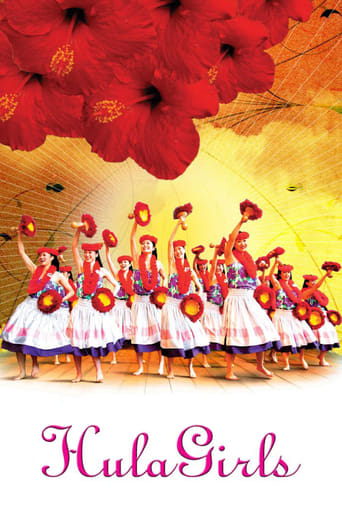calibear_todd
It's a surprising tearjerker, with good acting and strong characters you would expect who originated in the Iwaki coal mine, but it whitewashes the fact that much of that mine's wealth was as a result of WW2 slave labor. This is a problem the Japanese seem to have in confronting their history. Unfortunately, it wasn't only Japanese who suffered in the coal mines!
sapporonun
Between 1966 and 1970 I was stationed at Misawa AFB in Aomori Prefecture, Japan. I had a car and traveled a lot. Eventually went to the Joban Hawaiian Center at the suggestion of a Japanese friend and fell in love with the place. I made the JHC my main spot for R&R after that and even scheduled several trips there for my coworkers.This movie is NOT a comedy, in my mind, but a true life story about overcoming tragedy. I went to the JHC very often and the dancers and staff got to know me well. Between performances I often drank coke with the Hula dancers and on one visit I was asked to help a male-female duet with the pronunciation of the words for "The Hawaiian Wedding Song". I watch this movie every chance I get and it always brings tears to my eyes. The Joban Hawaiian center is one of the reasons I eventually spent 30 years teaching English in Japan (returned to the U.S. in Feb. 2014).
SailingSwanee
Sat down with my daughter to watch this movie, not really sure what to expect. I am a fan of foreign movies, particularly Korean, Chinese, and Japanese, but also other parts of the world, so I don't mind watching with subtitles. In fact, I find foreign films much more realistic than a lot of the tripe out of Hollywood.This movie is very emotional, bringing tears (mostly happy ones) to both me and my daughter. The story is well told and the acting brilliant, and some of the gorgeous Japanese girls certainly helped to light up the screen, especially Yu Aoi who won "Outstanding Performance by an Actress in a Supporting Role" in the Japan Academy Prize.Realising at the end that this movie was based on an actually true story added much more realism to the story, and the plight of the girls and their families.A very inspirational movie, and a delight to watch. Why this only has 7 out of 10 on IMDb (at time of writing) surprises me. We loved it!!! Do yourself a favour and watch it.
Bill
Make no mistake about it, this is a Japanese comedy, with few ties to Hawaii. But that doesn't take away from the fact the film is wonderfully scored, believably acted, and a fun, entertaining movie. Screened for the first time in the U.S. in October 2006 as the finale gala extravaganza at the Hawaii International Film Festival (#1 Asian festival & one of world's 10 best overall now), many hula teachers and Hawaii fans may have feared this movie might take a less- than-serious-enough view of the sacred Hawaiian dance. But, upon viewing this light-hearted comedy, critics had to sit back and appreciate just how loyal the film remained to the Japanese interpretation of hula. Japanese view hula as a dance, and Hawaii as a warm tropical paradise in much the same way American filmmakers viewed Hawaii in the 1950s. Viewers, even kumu hula and critics, shouldn't forget that this is a film about that Japanese interpretation - at that time, and not impose upon it the serious more cultural aspects a current movement in Hawaii is bringing back to the dance. In fact, the director of "Hula Garu" successfully gets away with this by making the film a comedy, and never trying to delve into the historical, religious, or other cultural dimensions of hula. While not true to today's view of hula in Hawaii, this film is not about today, or Hawaii. It's about an obscure little town in northern Japan that created a Hawaiian village concept, complete with its own hula troupe to attract tourists and save the town from extinction. Several heart warming moments in this 'To Sir With Love,' teacher-conquers- impossible-odds themed story bring tears to the spectators' eyes. And the music could hardly have been more perfect to help accentuate those emotional moments. Ukulele virtuoso Jake Shimabukuro's score is perfect, and likely to win awards, and possibly even help make Jake a household name on the U.S. mainland, as it already has become in many circles in Japan. The film's screenplay successfully draws the audience into the characters in a way that forces even the most critical hula fans to forgive the film's small imperfections. The only strong disappointment I had about the film was how it confused hula and Tahitian dancing. On the other hand, that's a common misconception that all Hawaii visitors make, since hula troups almost always perform both types of dances in public. So, in a sense, the film is true to the way Japanese and tourists perceive hula, if not to hula itself. This film is not a film about Hawaii or hula dancing; but a comedy about how Japanese have adopted this wonderful dance in its own way, while respecting the Hawaiian culture in doing so. Keeping that in mind, viewers will have little to critique and everything to enjoy about this film, the acting, and the wonderful music. Overall, this is a fun, enjoyable family movie which deserves to be seen on the big screen. Don't wait to rent the video. See it in a theater and feel the energy, the music, and the strange story that began Japan's growing love for Hawaii's greatest export.



